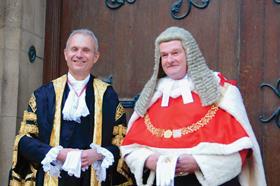’It is hard to see how the lord chancellor can survive,’ Gazette contributor Joshua Rozenberg predicted in April. Sure enough, Liz Truss was replaced in June by David Lidington, who became the fifth person to hold the post (and the fourth non-lawyer) in five years.
Overall, 2017 was a year for leaving the stage. Another casualty of the snap general election was the Prisons and Courts Bill, through which the government had promised (or threatened) reforms in areas ranging from whiplash injuries to the online courts. In an even bigger embarrassment for the government it bid farewell to employment tribunal fees after the Supreme Court’s ruling in July that the regime introduced in 2015 was unlawful.

On the bench, we saw the retirement of a lord chief justice, Lord Thomas of Cwmgiedd, and a president of the Supreme Court, Lord Neuberger of Abbotsbury. Their successors, Lord Burnett of Maldon and Lady Hale of Richmond, were already making their mark as the year drew to a close.
The year opened with the biggest law firm collapse in several years when the European arm of global firm King & Wood Mallesons fell into administration following months of speculation. A resulting administrator’s report revealed that the firm had debt including at least £16 million owed to Barclays. In March, the personal injury sector said goodbye to Bolton-based Asons Solicitors after an intervention by the Solicitors Regulation Authority. Other casualties of the year included Manchester firm Almond Solicitors, Mellor Hargreaves Solicitors, Heaney Watson and the listed company Fairpoint.
A notable survivor was London human rights firm Leigh Day, which was cleared of misconduct relating to Iraq war cases in the longest - and most expensive - hearing ever the Solicitors Disciplinary Tribunal. We can expect this case to continue into 2018 when the SRA appeals the decision.
The historic term ‘chancery’ was officially abolished in June when the courts of the Chancery Division, along with other specialist High Court lists and courts, received a new export-friendly brand name, the Business and Property Courts. Another court consigned to history was the International Criminal Tribunal for the Former Yugoslavia, which closed in December. It wound up on a dramatic note, with the jailing of Bosnian Serb general Ratko Mladic and the death of Bosnian Croat commander Slobodan Praljak after drinking poison in the dock.
But 2017 was also a year of harbingers of things to come. In the solicitors’ profession it will be remembered as the year in which a major overhaul in training and qualification, the solicitors qualifying examination, received the green light. For details of the scheme, including what it will cost, we will have to wait until next year.
Another indicator of changing practices was announcements by several top City and international firms of cuts in support and backroom staff. International firm Pinsent Masons, insurance litigation firm BLM and magic circle firm Freshfields Bruckhaus Deringer all cut, or offered voluntary redundancy to, swathes of support staff.
One driver of change will be artificial intelligence, which surely went mainstream in 2017, with numerous announcements by leading firms. In May, the UK’s most successful legal AI start-up, RAVN, was acquired by US document-management giant iManage for an undisclosed sum. Meanwhile Magic Circle firm Allen & Overy opened its ‘Fuse’ technology innovation space, in which technology companies, lawyers and clients can ‘collaborate to explore, develop and test legal, regulatory and deal-related solutions’.
Another technology making headlines in 2017 was blockchain - notoriously associated with bitcoin and other digital currencies, but also creating the possibility of self-executing 'smart' contracts and new types of asset registers. In October, a £700,000 commercial property in Trowbridge became the first to be sold in a UK transaction verified with blockchain.
An interesting development during the year was the emergence of an international market in commercial dispute resolution, with announcements of English language common-law courts in Amsterdam - and, remarkably, Paris. Which, of course, leads us to the topic of Brexit. Legal debate was dominated by questions over the role of the Court of Justice of the European Union during the process of leaving and thereafter. One certainty was that this will continue to be a hot topic in 2018.
A related issue was the fate of the UK's role in Europe's Unified Patent Court, in theory due to open in 2018. The UK’s ratification process was nearing its final stage as the year drew to a close, with Whitehall still maintaining the line that, although the court is open only to EU members, it is not in itself an EU institution. However a challenge to Germany's constitutional court could yet derail the entire process.
Of the stories that exercised Gazette readers over the year, our report on a costs judge's ruling that a £72,000 bill for a £3,000 claim was 'disproportionate' attracted the largest number of published comments: 153.
Finally, two Gazette awards. The award for quote of the year goes to Wanda Goldwag, chair of the Office for Legal Complaints. Challenged at a parliamentary hearing by Alberto Costa MP to name the main legal regulators, she understandably foundered: 'I know the major ones… the solicitors, the barristers’. And a special award for transparency goes to the Solicitors Regulation Authority, which, while generating a stream of proposals for law firms to publish more data about their prices and complaint record, decided that journalists and the public were no longer welcome at its monthly board meetings.
The Gazette will no doubt have plenty to report in 2018.




























No comments yet